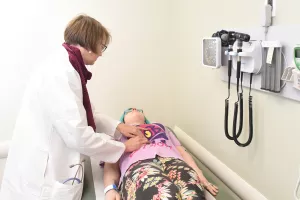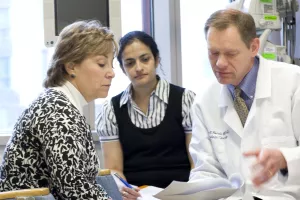Gallbladder cancer is a rare form of cancer that starts in the gallbladder — a small, pear-shaped organ underneath the liver. We personalize each treatment path based on 2 factors: if the gallbladder cancer is resectable (completely removed with surgery) or unresectable (unable to be removed with surgery).
How does the gallbladder work?
The gallbladder and liver work together as a dynamic duo for your digestive system. Connected to each other with bile ducts, the gallbladder stores bile created by the liver to help the body digest fats.
Gallbladder cancer usually develops in the innermost layers of the gallbladder and gradually spreads to surrounding tissues. And because the gallbladder is tiny and largely hidden by the liver, detecting cancer early on or during a routine physical exam is especially challenging.
Cancerous cells in this part of your body can take a toll on healthy bodily functions. Should you receive a gallbladder cancer diagnosis, we’re here to over-deliver when your care needs are anything but average.

Conditions
Gallbladder cancer is at its most treatable stage when discovered early on. But given the gallbladder’s tricky location in the body, most people don’t notice symptoms until their condition becomes more advanced.
It’s important to note that a handful of gallbladder cancer symptoms can overlap with other conditions. We encourage you to err on the safe side and speak to your doctor as soon as possible if you begin experiencing these common gallbladder cancer symptoms:
Testing
While there isn't a single screening test that can alert you to a possible gallbladder cancer diagnosis, there are steps you can take to stay ahead of your health. Let your doctor know if you have a family history of gallbladder cancer or other gallbladder diseases. We can keep an eye on your risk level with routine blood tests.
And should your doctor suspect you’re living with gallbladder cancer, they’ll turn to a variety of imaging tests as well as an endoscopic retrograde cholangiopancreatography (ERCP) to confirm a diagnosis.
Imaging tests
We order to the following imaging tests to better understand the root of your symptoms and to identify the tumor's location:
- Abdominal ultrasound
- CT scan
- Endoscopic ultrasound
- Magnetic resonance cholangiopancreatography (MRCP)
- MRI
Endoscopic retrograde cholangiopancreatography (ERCP)
An ERCP is a test that evaluates the bile ducts — a common location for gallbladder tumors. It can also help us obtain a small tissue sample for further analysis.
During the procedure, a small tube about the width of a ballpoint pen is inserted through the mouth, passed through the esophagus and into the stomach. From there, we inject a dye into the bile ducts to look for blockages.
Stages of gallbladder cancer
Once we’ve confirmed that you’re living with gallbladder cancer, it’s important to understand if the disease is spreading and, if so, how far. This process is called staging, and it helps us design the most effective care plan for you.
- Stage I: Cancer is limited to the inner layers of the gallbladder.
- Stage II: Cancer has grown beyond the outer layer of the gallbladder and possibly into a nearby organ like the liver, stomach, intestines, pancreas or lymph nodes.
- Stage III: Cancer has invaded more than 1 of the nearby organs, veins or arteries.
- Stage IV: Cancerous tumors of any size have spread to distant areas of the body.
Treatments
We’ll bring together the brightest minds in the field to cover your wellness from all angles. We’ll treat you on your terms to slow or stop cancer growth and empower you with more time to live your life how you want to.
Determining if your gallbladder cancer is resectable or unresectable will influence how we approach your personalized treatment path.
- Resectable gallbladder cancer: Surgery is the best treatment option because the cancer is local to the gallbladder and in a reachable place.
- Unresectable gallbladder cancer: The focus is to control the spread and size of the cancer with surgery and other therapies because a complete cure isn’t possible with surgery alone.
Early stage gallbladder cancer is oftentimes treated with surgery. That involves removing the gallbladder as well as part of the liver and surrounding lymph nodes, if needed. After surgery, a combination of chemotherapy and radiotherapy can help prevent new tumors from developing.
Late stage gallbladder cancer has more limited treatment options because surgery isn't an effective approach. If the cancer has spread outside the gallbladder, chemotherapy and radiation therapy can manage tumor growth and symptoms. Our main goal here is to help you live a longer and more comfortable life.
Support services
Our experienced team understands how overwhelming a cancer diagnosis can be. That's why we pair leading-edge cancer treatment with support services that put your comfort and wellbeing first, like:
- Acupuncture
- Massage
- Mental health support
- Nutrition counseling
- Pain management
- Reiki therapy
FAQs
People who are at greater risk for gallbladder cancer than the overall population include:
- American Indian and Alaska Native persons
- Older people with a history of gallstones or other gallbladder diseases
- Women and assigned females at birth (AFAB)

From regular office visits to inpatient stays, find the healthcare you need and deserve close to home.

Meet the doctors and care team devoted to supporting you every step of the way along your path to better health.